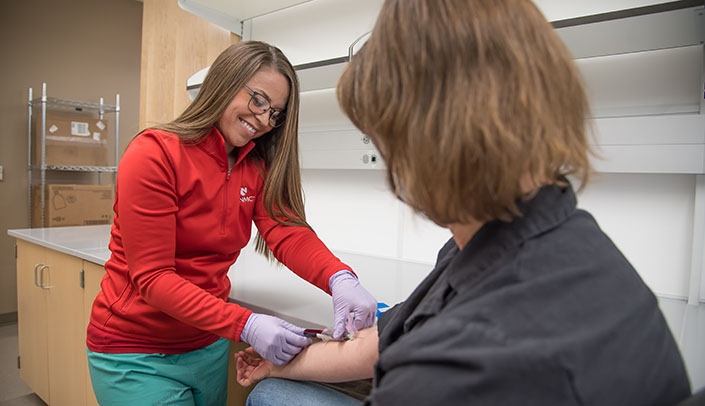With no early detection or screening method, a diagnosis of pancreatic cancer is devastating. The disease has a five-year survival rate of less than nine percent. And for people with a family history of pancreatic cancer, the lack of detection options leaves them feeling unsure about their own future health.
“People who have lost a family member to pancreas cancer are highly motivated to change the trajectory of this disease,” said Christina Hoy, D.N.P., project coordinator of a new study at UNMC.
UNMC researchers are conducting a study for those with a higher than average risk to develop pancreatic cancer, including those with a family history. Every six months, study participants come in to answer questions and undergo blood draws. While there is still no screening for pancreatic cancer, UNMC scientists are hoping this research could lead to a screen for clinical and blood markers of the disease someday.
“We’re not detecting pancreas cancer early in participants who are enrolled in this specific study, but the goal is to come up with a blood test we can draw in the future,” Dr. Hoy said.
The study is part of UNMC’s ongoing fight against pancreatic cancer. The medical center already is nationally known for its pancreatic cancer research. Now, it is ramping up its effort, creating what scientists call a “center of excellence,” recruiting more faculty, and allocating more resources. Hoy reports that UNMC is now part of a collaborative effort with multiple cancer centers around the U.S. attempting to develop an early detection method.
“Historically, pancreas cancer wasn’t a well-funded disease to study. But that is changing. And there’s more funding now. There’s more attention to this disease,” Dr. Hoy said.
The information provided by the study’s enrollees is “an absolute treasure,” said the study’s primary investigator, Kelsey Klute, M.D., UNMC assistant professor of oncology and hematology.
The ability to detect pancreatic cancer early would be a significant achievement in the medical world, and the UNMC team is committed to find answers for future generations. “This is the time and this is the place, and these are the people who are going to do this,” said UNMC Chancellor Jeffrey P. Gold, M.D.
“I’m very proud to be a part of this team,” Dr. Hoy said. “This disease is difficult. And so, if this is just one drop in the bucket, to change how it impacts people and their prognosis, I am incredibly proud to be here and doing this.”
For more information about the study visit Clinical Trials or call (402) 559-1577.

If you are looking for more participants, my mother died of pancreatic cancer and my age is 51 years so it runs in my family. I would be interested in helping out.